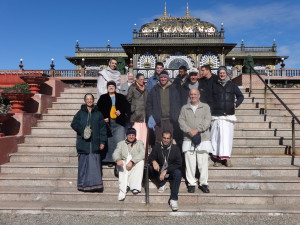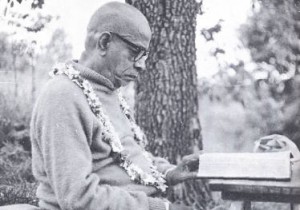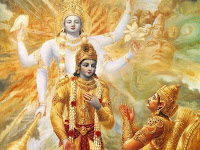
New Vrindaban board members, residents & well-wishers outside Srila Prabhupada’s Palace.
Minutes of the Semi Annual Joint Board Meeting Of New Vrindaban
November 10, 2013
Day 3 of 3
ISKCON New Vrindaban (INV) Vision Statement: Founded in 1968, Srila Prabhupada boldly envisions New Vrindaban as a sacred place known worldwide for Cow Protection, Self-Sufficiency, Holy Pilgrimage, Spiritual Education, and, above all, Loving Krishna.
ECO-Vrindaban Mission Statement: ECOV (Earth, Cows, Opportunities & Vrindaban Villages) is dedicated to cow protection, sustainable agriculture, self-sufficiency and simple living — all centered around loving service to Sri Krishna, as envisioned by the ISKCON New Vrindaban Founder-Acharya, His Divine Grace A.C. Bhaktivedanta Swami Prabhupada.
INV Board Members: Dayavira, Chaitanya Mangala, Ranaka, Jaya Krsna, Gopisa, Tamohara
ECOV Board Members: Navin Shyam, Kripamaya, Madhava Gosh, Ranaka, Chaitanya Mangala, Anuttama
GBC: Malati, Tamohara, Anuttama
Recording Secretary: Laxmi Honest
Guests: Keval Patel, Bhima Walker
Chaitanya Mangala gave a report on the ECO-Vrindaban integrated auxiliary transformation. An issue arose when ECOV realized that most of its income would soon come from gas royalties. Unless the organization obtained an integrated auxiliary status, similar to that of a church, the IRS would reclassify it as a private foundation and it would have to pay annual tax to the IRS on royalty and investment income.
The IRS will take approximately one year to process the application. During that time, ECOV may act as though it is approved. While this more accurately represents the relationship of the two entities for IRS purposes, it was also noted that it brings the two entities closer in service. By terms of integrated auxiliary status, INV has the authority to place one director on the ECOV board. That requirement could be met if either Ranaka or Chaitanya Mangala, who are currently on both boards, is officially chosen as the INV representative.
Devotees currently serving with ECOV are:
Anuttama – GBC
Kripamaya – President
Madhava Gosh – Vice President
Navin Shyam – Chairperson
Ranaka – Secretary-Treasurer & Lead Cowherd Man
Chaitanya Mangala – Board Member
Cow Protection Staff are:
Ray Kudurski, Ananda Vidya, Lalita Gopi and Caitanya Bhagavat
Project Managers in 2013:
Nityodita – NV Protected Cow Dairy Initiative
Tapahpunja – Vegetable gardens
Rafael – Fruit trees and bushes, Deity flower garden
Chota Jay Krsna – “Green” Lodge remodeling
ECOV plans to submit its 2013 financial reports to the INV board during the March/April 2014 bi-annual meeting.
In the operations review it was reported that there are 48 cows and 6 are being milked. The milking cows provide cream, butter and ghee daily for the Deities. Hay and potatoes were being grown and harvested all summer. More fruit and nut trees and berries were planted. Deity flowers were grown all summer. Eco friendly housing was built near the Garden of Seven Gates, a greenhouse was renovated and a garden irrigation system was installed.
ECOV provides broad community support.
$70,000 to INV for multiple projects
$45,000 for Dham Seva projects through the purchase of a bulldozer
$15,000 for Small Farm Training Center garden related projects
$12,000 to Gopal’s Garden School
$6,000 to ISCOWP for hay and general farm assistance
A total of $148,000 has been invested in the NV community so far in 2013.
In 2014 ECOV plans to:
Expand the Deity flower garden
Further develop bulk grain storage
Hire a Project Coordinator
Continue building more eco-housing
Plan an eco-village
Plant more fruit and nut trees and berries
Continue to support other efforts that are in line with the ECOV mission.
A report was given regarding gas royalties. The Snyder gas well net mineral acreage footprint has been reduced by about 100 acres. Of the total acres, INV has approximately 23 and ECOV has approximately 257.
The initial royalty checks received for gas income were incorrect. There were some errors in calculation and the amounts were smaller than anticipated. Gopisa has been talking to representatives at Chevron in this regard, but they have been unresponsive thus far.
Devotee care, counseling and spiritual enlivenment, encompassed the next topic. It was suggested that the old clinic building could become a clinic again, with counseling available. It could also service as a gathering place for new members.
Another suggestion was that some festivals should be developed specifically for the local devotees. A question was raised that since New Vrindaban has primarily evolved as a place of pilgrimage and a tourist attraction what can we do to strengthen relationships within the community? It was pointed out that Srila Prabhupada’s appearance and disappearance are festivals that are specific to devotees and could be good for this purpose.
Another suggestion was to figure out ways to get more community members involved in the other festivals.
Anuttama mentioned that in DC there is an annual appreciation dinner which has been very well received and could be incorporated in New Vrindaban.
The Palace Sangams with Srila Prabhupada at his Palace are going well with 20-30 devotees regularly in attendance, but there is still a sense that it is a place for tourists and not so much for the devotees. We have to continue to diligently work to change this mindset.
It was noted that 2016 is the 50th anniversary of ISKCON and 2018 is the 50th anniversary of New Vrindaban and the 20th anniversary of ECOV.
Planning for 2014, as well as the anniversary years, was discussed. There is a long list of desires. It was suggested that we need a list of projects with costs to set priorities. In view of the upcoming anniversaries, renovations at the Srila Prabhupada’s Palace are a top consideration.
Anuttama discussed world-wide plans for the ISKCON anniversary starting in 2015 in India when Srila Prabhupada departed for the US, then in Boston, Butler, New York etc.
This led to more discussion about Srila Prabhupada’s Palace as it should be in the best possible condition for the celebration.
Immediate projects were listed as:
Wrought iron work
Outside wall/windows
Four chatras
Front steps
Entry path railing
Gopisa will get costs and details on each of these specific areas and share these details with the Palace restoration subcommittee members.
Community Dialog
11/10/13
The program opened with kirtan led by Jaya Krsna who then welcomed the devotees and gave a presentation regarding Srila Prabhupada’s vision for New Vrindaban. As part of the presentation he discussed the transformation of New Vrindaban as a spiritual community and noted that some stages are very difficult. He explained that we are currently in one of those stages and we must keep our vision of developing a strong community and maintain our Brijabasi Spirit.
Jaya Krsna then introduced the GBC representatives Anuttama Prabhu, Malati Prabhu and Tamohara Prabhu who have volunteered their time and devotion to assist the boards. This was followed by introductions of the board members and of Keval Patel and Bhima Walker as guests of the boards.
INV Department heads then gave presentations of their activities throughout the past year. These were from the same slide presentations that were discussed in day one of the minutes.
Caitanya Mangala discussed the ECOV integrated Auxiliary plan for the benefit of the gathered devotees. He highlighted the work ECOV does in and around the community.
Anuttama discussed the ISKCON 50th anniversary in 2016 and asked for suggestions on how New Vrindaban would like to celebrate. Nityodita Prabhu suggested creating a data base of people who were here in the early days and also putting together a slide presentation from the old days. Oral histories could be recorded and a discussion of the importance of the movement begun. Other projects suggested were: a book and a documentary of the history, of New Vrindaban, a traveling art exhibit, interface with colleges, and prasadam distribution. As outreach the ideas were put forth of holding a type of cultural festival at Heritage Park or Wesbanco Arena in Wheeling.
It was suggested that we start something in 2015 to coincide with 50 years since Srila Prabhupada left India and traveled to America, which would make the focus more about Srila Prabhupada and then in 2016 it would be about his organization.
Madhavananda Prabhu expressed concerns about Tapahpunja. Jaya Krsna explained the arrangements between Tapahpunja and the INV management.
Jayasri Prabhu asked who would tend the gardens instead of Tapahpunja, and Jaya Krsna explained that going forward ECOV has agreed to manage the gardens.
Lalita Gopi Prabhu asked about Dham Seva and how that project is being served by INV. Jaya Krsna outlined the support that INV has given in the past year and assured her of continued commitment.
A proposal was made for the creation of an advisory committee made up of community members who are not board members. The idea is that this group would regularly meet with Jaya Krsna and discuss issues and concerns. It was generally agreed that something of this nature would be helpful and the details can be worked out for consideration at the December board meetings.



 The Hare Krishna’s gathered outside Nelson Mandela’s home in Houghton, Johannesburg and in true South African style, indeed Madiba style chanted, danced and distributed free vegetarian food to the throngs who had come to celebrate Mr. Mandela.
The Hare Krishna’s gathered outside Nelson Mandela’s home in Houghton, Johannesburg and in true South African style, indeed Madiba style chanted, danced and distributed free vegetarian food to the throngs who had come to celebrate Mr. Mandela.  63rd Birthday Celebration of HH Radhanath Swami in Farmington Hills, Michigan, United States. (7th Dec, 2013)
Picture Courtesy: Arjun Bhattacharyya
63rd Birthday Celebration of HH Radhanath Swami in Farmington Hills, Michigan, United States. (7th Dec, 2013)
Picture Courtesy: Arjun Bhattacharyya  Sanctuary of Truth Pattaya
Sanctuary of Truth Pattaya  Pattaya is a city in Thailand, a beach resort popular with tourists and expatriates. It is located on the east coast of the Gulf of Thailand, about 100 km southeast of Bangkok within but not part of Amphoe Bang Lamung in the province of Chonburi
Pattaya is a city in Thailand, a beach resort popular with tourists and expatriates. It is located on the east coast of the Gulf of Thailand, about 100 km southeast of Bangkok within but not part of Amphoe Bang Lamung in the province of Chonburi  Cows & Sattva Guna. This brief article explains how cows are helpful in
developing sattva guna and how we benefit from serving them
Cows & Sattva Guna. This brief article explains how cows are helpful in
developing sattva guna and how we benefit from serving them  Indradyumna Swami: Please all of you pray that I might quickly recover and return to the preaching field for the pleasure of Srila Prabhupada
Indradyumna Swami: Please all of you pray that I might quickly recover and return to the preaching field for the pleasure of Srila Prabhupada 

 (Kadamba Kanana Swami, September 2008, South Africa, Ratha Yatra Lecture)
(Kadamba Kanana Swami, September 2008, South Africa, Ratha Yatra Lecture) At 30Th November Iskcon Gita Nagari Installed A New Alter For Radha Damodar And Srila Prabhupada By Bhakticaru Swami
At 30Th November Iskcon Gita Nagari Installed A New Alter For Radha Damodar And Srila Prabhupada By Bhakticaru Swami  Often called "Food For Life," Prasadam is food that has been cooked by love and devotion by devotees of Krishna and offered to Krishna. After Krishna has enjoyed the meal the remnants become "Prasadam." Hare Krishna devotees distribute this prasdam to the general public with the understanding that when they eat prasadam they become purified of all material contamination and become qualified to develop love for God, Krishna
Often called "Food For Life," Prasadam is food that has been cooked by love and devotion by devotees of Krishna and offered to Krishna. After Krishna has enjoyed the meal the remnants become "Prasadam." Hare Krishna devotees distribute this prasdam to the general public with the understanding that when they eat prasadam they become purified of all material contamination and become qualified to develop love for God, Krishna  From 1974 to Rome in the service of the mission of AC Bhaktivedanta Swami Prabhupada to spread the spiritual science of the Bhagavad-Gita and Srimad-Bhagavatam
From 1974 to Rome in the service of the mission of AC Bhaktivedanta Swami Prabhupada to spread the spiritual science of the Bhagavad-Gita and Srimad-Bhagavatam  The dilemma my companion was going through was who was right and how can there be differing opinions? To this, I responded that there is no dispute that the guru principal is essential in aiding the spiritual student towards spiritual progress. We all agree with that. For many issues such as this one, you have a right and left wing circumstance. Without two wings a bird can’t fly. Let the two positions be deliberated upon and something fairly satisfactory should be the outcome.
The dilemma my companion was going through was who was right and how can there be differing opinions? To this, I responded that there is no dispute that the guru principal is essential in aiding the spiritual student towards spiritual progress. We all agree with that. For many issues such as this one, you have a right and left wing circumstance. Without two wings a bird can’t fly. Let the two positions be deliberated upon and something fairly satisfactory should be the outcome. 
.jpg)